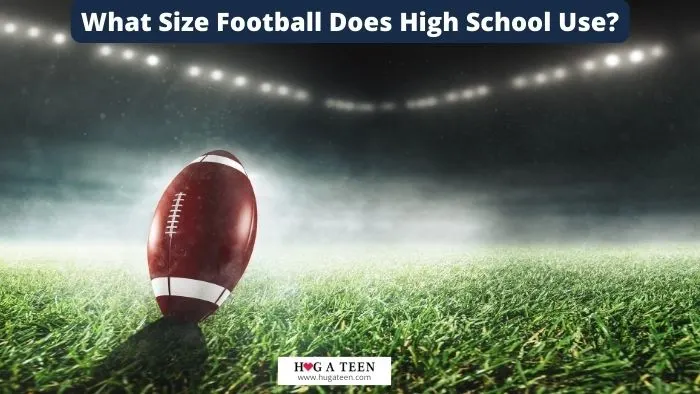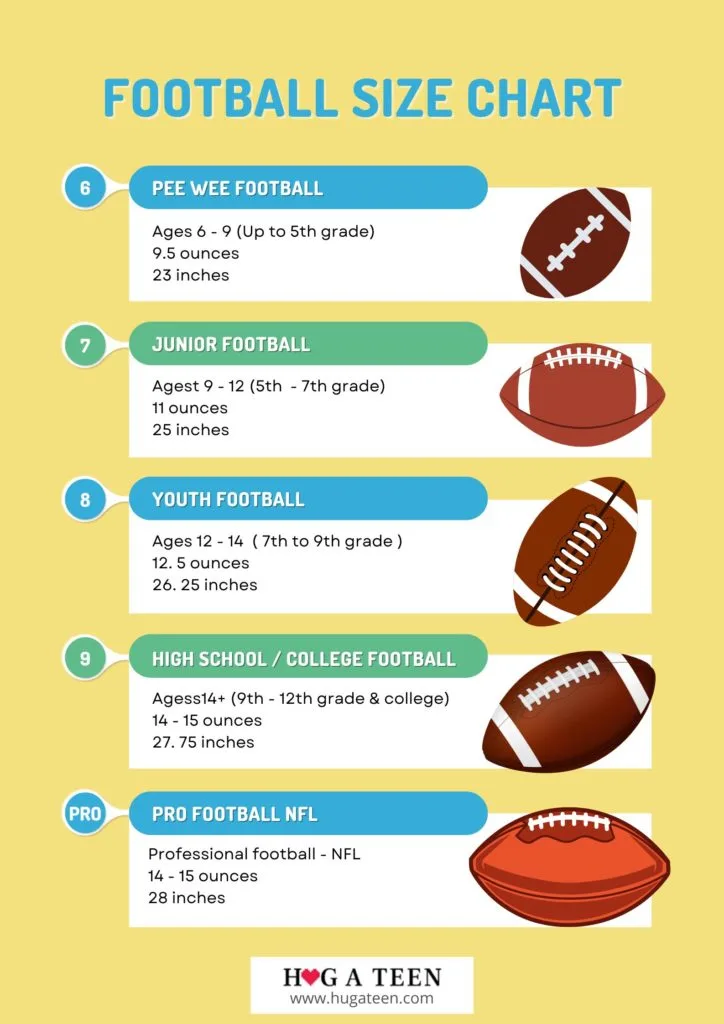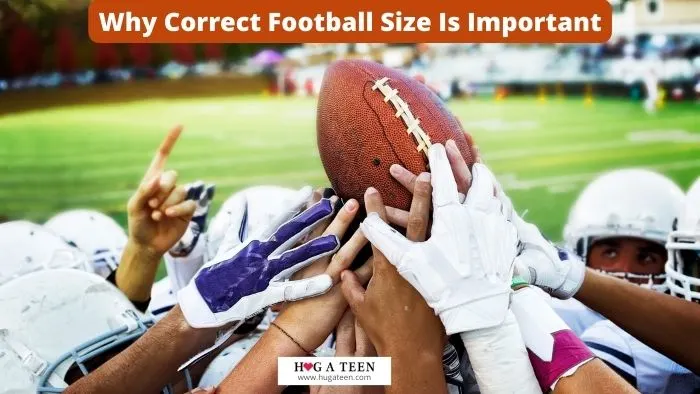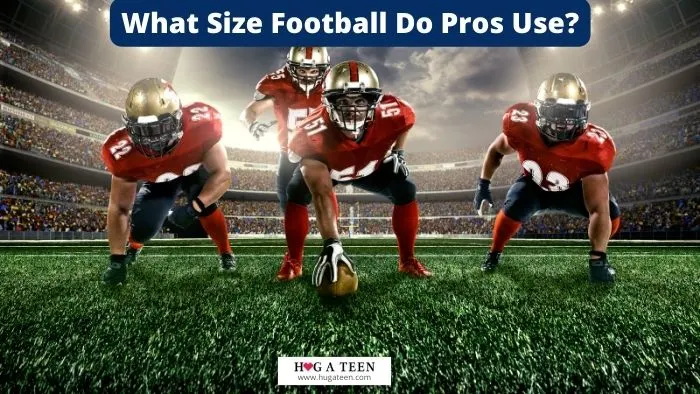Footballs come in different sizes to suit the age of the players and ensure comfortable use. If you are wondering what size football is used in high school, read on to find out.
Please Note: this article discusses American football and not British football (or soccer) sizes. Soccer balls range from sizes 1 to 5, while footballs range from 6 to 9.
You might also like to know: What Does Holding Up 4 Fingers Mean? (in football)
What Size Football Does High School Use?

High school football players use a size 9 football, designed to suit players from 14 years old and up. This football size measures 10.5 to 11.5 inches in length, with a circumference of roughly 28 inches on the long side of the ball and 21 inches on the short side of the ball.
High school footballs fall under the same sizes and regulations as official college balls. The size 9 football is a little weighted compared to smaller versions since the players that use it require a heavier ball to match their body and skillset at the high school level.
The size of this football is similar to and close to the ball size used in professional games. The goal of making these balls as close to professional games ones is to help high schoolers get accustomed to using them, especially if they want to pursue football professionally.
On this note, high school footballs are close to official college footballs, but there is a slight increase in size at the NFL level. The good thing is that the difference is small and almost insignificant; therefore, high school players can easily transition to NFL-level footballs.
What Football Do Most High Schools Use?

Most high schools use footballs in size 9. This size of a football is designed to match high schoolers’ bodies and skillset and is built to maintain comfort when handling the ball. The size 9 footballs are close to those used in a professional football game, so high schoolers looking to play football professionally build experience playing with an almost similar football.
In competitive football, players can choose between composite or leather balls. Leather footballs are more expensive than composite footballs, and once avid players reach 14, they should consider purchasing leather balls.
A composite leather football’s texture makes it easy to grip, and the material is more moisture-resistant than natural leather.
- High school football
- Official Size 9
- Ages 14+
- Leather
- Patented accurate control lacing
College Football Size
College football size is similar to that of high school. This ball comes in a size 9, measuring about 10.5 to 11.5 inches. The ball measures about 28 inches in diameter on the long side and roughly 21 inches on the shorter side of the ball.
Youth Size Football
Footballs are available in three sizes for kids ages 6 to 14: pee wees, juniors, and youths.
The Youth size football comes in size 8, which is slightly smaller than that of high school. This football measures about 26.5 inches in circumference on the long side and 19.25 inches on the short side of the ball. The youth side football weighs around 12.5 ounces, a perfect weight for younger players to get a comfortable and enhanced grip. Youth size footballs (size 8) are best for players ages 12 to 14.
- Youth football
- Size 8
- Ages 12-14
- Leather
- ACL is pebbled providing more grip in all conditions.
Junior Football Size
The junior size football comes in size 7. Children ages 9 to 12 are ready for Junior class footballs. This football measures about 25 inches in circumference on the long side and 18.5 inches on the short side of the ball. It is slightly smaller than the youth size football to suit younger players’ small hands.
Pee Wee Football Size
The Pee Wee football comes in size 6, which is designed to fit the hands of children ages 6 to 9. This ball measures about 24 inches in circumference on the long side and about 17.5 inches on the shorter side of the ball. It weighs about 10 ounces which is lightweight enough for young players to handle comfortably.
For younger kids, the mini football will be fine.
Football Sizes Chart By Age Group
Check out the football size chart below to help you choose the correct size football for your child:
| Age | Grade | Name | Size | Weight | Length | Short C | Long C |
|---|---|---|---|---|---|---|---|
| Ages 6 and under | Mini Football | Mini | Light Foam | 8.5 inches | |||
| Ages 6 - 9 | Up to 5th grade | Pee Wee | Size 6 | 9.5 ounces | 9.5 inches | 17.25 inches | 23 inches |
| Ages 9 - 12 | 5th to 7th grades | Junior Football | Size 7 | 11 ounces | 10.5 inches | 18.5 inches | 25 inches |
| Ages 12 -14 | 7th to 9th grades | Youth Football | Size 8 | 12.5 ounces | 11 inches | 19.25 inches | 26.25 inches |
| Ages 14 + | 9th to 12th grades | High School Football | Size 9 | 14 - 15 ounces | 10.5 - 11.5 inches | 20.75 inches | 27.75 inches |
| College Footballs | College | College Football | Size 9 | 14 - 15 ounces | 10.5 - 11.5 inches | 20.75 inches | 27.75 inches |
| Professional | Professional | Official Pro Ball | NFL Size 9 | 14 - 15 ounces | 11 - 11. 25 inches | 21 inches | 28 inches |
Why Correct Football Sizes Are Important

Getting the right size of football ensures the ball is comfortable for the intended age group of players. The correct football contributes to performance and training to a great extent; therefore, the need to ensure players have a proper and comfortable grip on the ball.
Young children should never be overburdened with a ball that is too heavy or large for their size, weight, and agility when learning ball control and other soccer skills.
Getting kids interested in football and teaching the basics are the most important aspects of youth football.
If a child has a ball that is too large, they may become frustrated with their perceived lack of ability and lose interest in playing.
It would be tough for a 9- or 10-year-old kid to throw a pro football.
By using the correct youth football sizes for the kids they are coaching, coaches and parents can ensure the development of a young player or team.
Does hand size matter when throwing a football?
Hand size is important when throwing a football, especially for quarterbacks. Small hands are difficult to maintain an excellent grip on, especially in bad weather conditions. The bigger the hands, the better the grip and, in turn, the better the performance.
Is it harder to catch a football with small hands?
It is harder to catch a football with small hands. This is because small hands can be a problem in getting a firm grip on the ball, regardless of the weather conditions. The longer the fingers, the better the grip, so catching a ball with small hands is harder.
Are big hands good for football?
Big hands are good for football since they provide a firm and secure grip on the ball, regardless of the conditions. Big hands can easily wrap around a football and keep the ball in place, better than small hands.
What is a good hand size in the NFL?
A good hand size in the NFL is approximately 9.5 inches handspan. That is the measurement between the thumb tip and the pinky fingertip with the hand wide open.
Who has the biggest hands in NFL?
DeForest Buckner, Gosder Cherilus, and Mo Alie-Cox have the biggest hands in NFL. Their hands have a handspan of 11.75 inches from the thumb tip to the pinky fingertip.
Who has the smallest hands in NFL?
Tayson Hill (New Orleans Saints has the smallest hands in NFL measuring 8.75 inches. Joe Burrow, Ryan Tannehill, and Jared Goff have the next smallest hands in NFL. Their hands measure 9 inches.
Related Football Size Questions

What size football do pros use?
Pros use football size 9, which is an excellent choice for players from 14 years old and above. While high school, college, and pro footballs have similar specifications, pro balls are slightly larger. This size is somewhat (up to 1 1/4 inches) larger than that used in college football; it measures 11 to 11.2 inches in length and has a circumference of 28 inches on the long side and 21 inches on the short side of the ball.
Official college footballs differ from those used in the NFL and other professional leagues by having two 1-inch half-stripes on either end.
What size football do 8th graders use?
8th graders use size 8 football, which is designed for school-age players between 12 and 14. This youth football size measures 26.25 inches in circumference on the long side and 19.25 inches on the short side of the ball.
What size football do 16-year-olds use?
16-year-olds use football size 9. Although players will use different-sized balls as they get older, the size 9 football is designed for players from 14 years old and up. This is the high school level football size which is slightly smaller than professional-grade balls.
How is college football different from high school?
The difference between college football and high school football is negligible and insignificant. By high school, players will most likely have developed their hands to full size, which might not change in college.
What is the difference in size between high school footballs and NFL footballs?
High school footballs come in a size 9, which is approximately 11 to 11.5 inches in length. The long side of the ball for NFL balls measures between 27.75 – 28.5 inches, and the short side measures 20.75 – 21.125 inches. NFL footballs are slightly bigger than high school footballs by 1 to 1 ¼ inch. The difference in size is negligible, but regulations demand NFL balls to meet specific ball characteristics such as a length of 21 ¼ inches.
The circumference of college footballs ranges from 20.75 inches to 21.125 inches lengthwise from end to end, versus 21 inches to 21.125 inches in the NFL.





